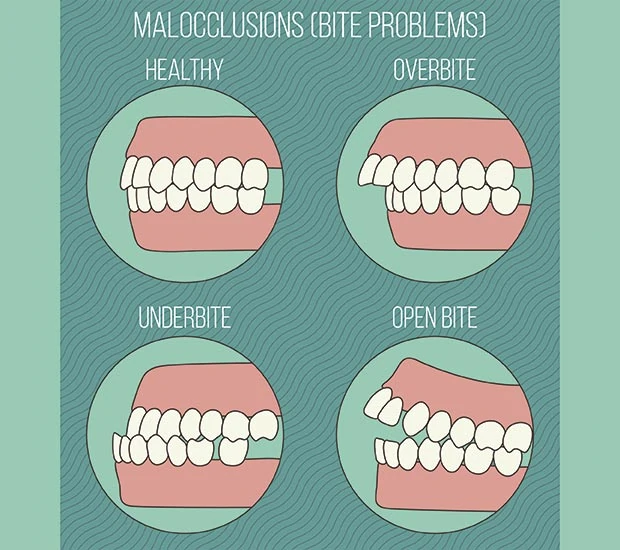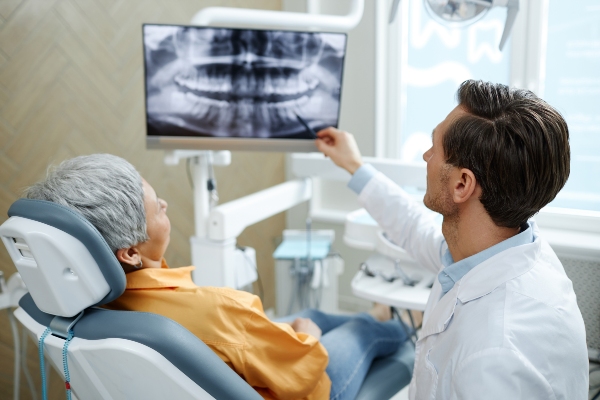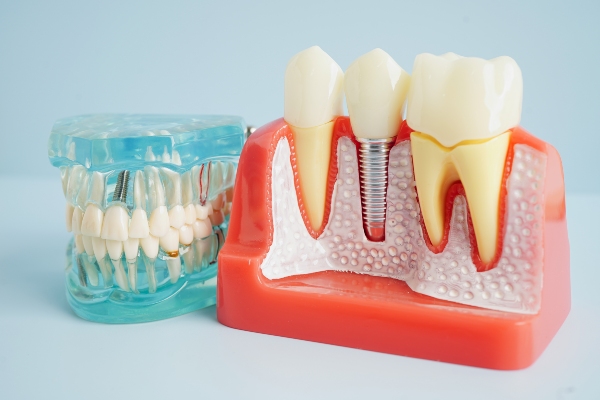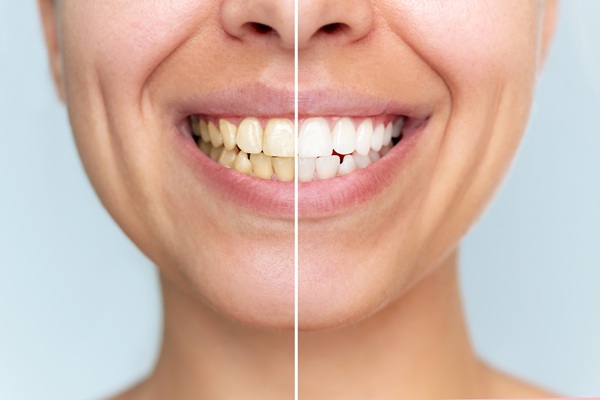MalocclusionsWinchester, TN
Malocclusions are abnormal alignments of the teeth and jaw that can cause various dental issues. Bite problems and uneven teeth can increase the risk of decay, tooth fracture, and uneven wear and affect the jaw and chin’s appearance. Fortunately, general dentists can help resolve such malocclusions.
We offer malocclusion diagnosis and treatment at Winchester Family Dentistry in Winchester, TN, and the surrounding area. Our team offers a wide range of options to help patients achieve straighter smiles. Call us today at (931) 283-5044 to learn more about our services or schedule an appointment.
Signs and Symptoms of Malocclusions
Malocclusions, also known as occlusal disease, are caused by a misalignment between the teeth of the upper and lower dental arches. If left untreated, occlusal disease can damage the teeth, the supporting bones and gums, temporomandibular joints, and the jaw muscles. Many people dismiss excessive or abnormally accelerated tooth wear as "natural aging or wearing" of teeth. However, the dentist can provide treatment for malocclusions to alleviate the pain and discomfort.
Symptoms of malocclusions can range from mild to severe. Some common symptoms include:
- Enamel wear
- Tooth cracking or breakage
- Tooth sensitivity
- Gum recession
- Loss of bone support
- Muscle pain
- TMJ symptoms
“If left untreated, occlusal disease can damage the teeth, the supporting bones and gums, temporomandibular joints, and the jaw muscles.”
Diagnosing Malocclusions
During an examination, we will check the patient’s teeth and jaw for malocclusions. This process involves identifying dental problems associated with malocclusions, such as uneven wear-and-tear, enamel erosion, and tooth sensitivity. We may also take X-rays and analyze the patient’s jaw when it is open, closed, and clenched to measure their bite.
There are three categories of malocclusions. Class I bites are the most common. People with this type of classification have a normal bite and mild misalignment. Severe overbites where the upper teeth and jaw overlap the lower are categorized as class II bites. Class III bites include severe underbites that cause the lower jaw to protrude forward. Our dental team can diagnose malocclusions and classify the type and severity to develop the appropriate treatment plan.
“Class III bites include severe underbites that cause the lower jaw to protrude forward.”
Preventing Malocclusions
Preventing malocclusions may be difficult, as people are often genetically predisposed to them. However, parents can help prevent environmental factors from causing issues by helping their children establish healthy habits. Parents should limit bottle feeding, thumb-sucking, and pacifier use. It is best to wean children off bottles and pacifiers by age two to prevent more severe maladaptive problems in the future.
The American Association of Orthodontics (AAO) recommends that children have their first evaluation by age seven. Early detection and intervention can resolve many misalignment issues. Children who receive early corrective treatment can prevent problems from developing, eliminate the cause, guide proper facial and bone growth, and ensure enough space is open for the permanent teeth to erupt.
“Children who receive early corrective treatment can prevent problems from developing, eliminate the cause, guide proper facial and bone growth, and ensure enough space open for the permanent teeth to erupt.”
The Initial Appointment
Evaluations allow patients to discuss their smile goals, concerns, and preferences. Our team will examine the patient’s teeth and take any necessary measurements, X-rays, photos, and impressions. This in-depth assessment will allow us to determine the possible treatment options and develop the right plan for each patient’s unique needs.
We will also discuss the treatment process and provide patients with an estimate of their treatment length. The length of treatment will depend on various factors such as age, the type of malocclusion, and the type of corrective appliance used. The more complex the malocclusion, the longer the treatment process may take.
“Evaluations allow patients to discuss their smile goals, concerns, and preferences.”
Malocclusion Treatment Options
There are more treatment options than ever to treat malocclusions. Some common options include clear aligners or braces. There are also various types of braces, such as lingual, self-ligating, ceramic, and conventional ones.
In some cases, patients may require supplemental appliances such as headgear or palate expanders to aid the treatment process. People interested in malocclusion treatment should contact our office to learn about our available treatment options.
After treatment, most patients will have to use a retainer for the rest of their lives. These appliances will help hold newly aligned teeth in place and prevent them from shifting to their pre-treatment position. Patients must continue to receive regular dental exams after treatment and maintain proper dental hygiene.
“There are also various types of braces, such as lingual, self-ligating, ceramic, and conventional ones.”
Questions Answered on This Page
Q. What are the symptoms of malocclusions?
Q. How is malocclusion diagnosed?
Q. How can I prevent malocclusion?
Frequently Asked Questions
Q. What is a bite malocclusion?
A. In a healthy bite, the upper teeth fit just over the lower teeth. However, in some patients, the lower jaw may protrude or slide backward. Other patients may have a crossbite, which causes the jaw to slide to one side. Jaw misalignments are known as malocclusion.
Q. What dental problems can result from malocclusion?
A. Young patients may develop a speech impediment, such as a lisp. Malocclusions can also lead to tooth crowding, and over time, plaque may build up. Patients with malocclusion are at a higher risk of tooth decay. Sometimes, patients with malocclusion notice changes in their jaw's appearance. Patients may feel self-conscious about crooked or misaligned facial features. Treatment can help align the jaw and improve facial symmetry.
Q. How do malocclusions affect dental health?
A. A bad bite can lead to uneven wear patterns. Over time, uneven wear may trigger tooth fractures and sensitivity. Some patients also develop gum problems. Patients with bite problems can develop crooked teeth, too. Food particles often become trapped within these crevices. These patients are at a higher risk of plaque, decay, and gum disease.
Q. How do braces move teeth?
A. Braces move teeth by applying constant and gradual pressure over time. This force slowly moves the teeth into their desired position. Patients’ jaws will also gradually change to accommodate this pressure.
Q. How much does malocclusion treatment cost?
A. Treatment costs can vary depending on the type of treatment, insurance coverage, and other factors. Every insurance plan is different. People should contact their insurance provider for more coverage information before seeking treatment.
Definition of Orthodontic Terminology
- Headgear
- Headgear is an appliance that aids in bite correction and proper jaw growth and alignment.
- Jawbone
- The jawbone is the bone of either the mandible or maxilla.
Call Us Today
At Winchester Family Dentistry, our goal is to preserve the oral health of all of our patients. Our team strives to anticipate the long-term outcomes of restorative treatment. Treating occlusal disease can lead to a long life of optimal oral health and restorative treatment success. Call us at (931) 283-5044 at our Winchester office to learn more about our services or schedule an appointment.
Contact Us
Winchester Family Dentistry is located at 1741 Bypass Rd. Winchester, TN 37398.
Helpful Related Links
- American Dental Association (ADA). Glossary of Dental Clinical Terms. 2025
- American Academy of Cosmetic Dentistry® (AACD). Home Page. 2025
- WebMD. WebMD’s Oral Care Guide. 2025
About our business and website security
- Winchester Family Dentistry was established in 2011.
- We accept the following payment methods: American Express, Cash, Check, Discover, MasterCard, and Visa
- We serve patients from the following counties: Franklin
- We serve patients from the following cities: Winchester, Decherd, Cowan, Estill Springs, Belvidere, and Sewanee
- National Provider Identifier Database (1629220686). View NPI Registry Information
- Norton Safe Web. View Details
- Trend Micro Site Safety Center. View Details






